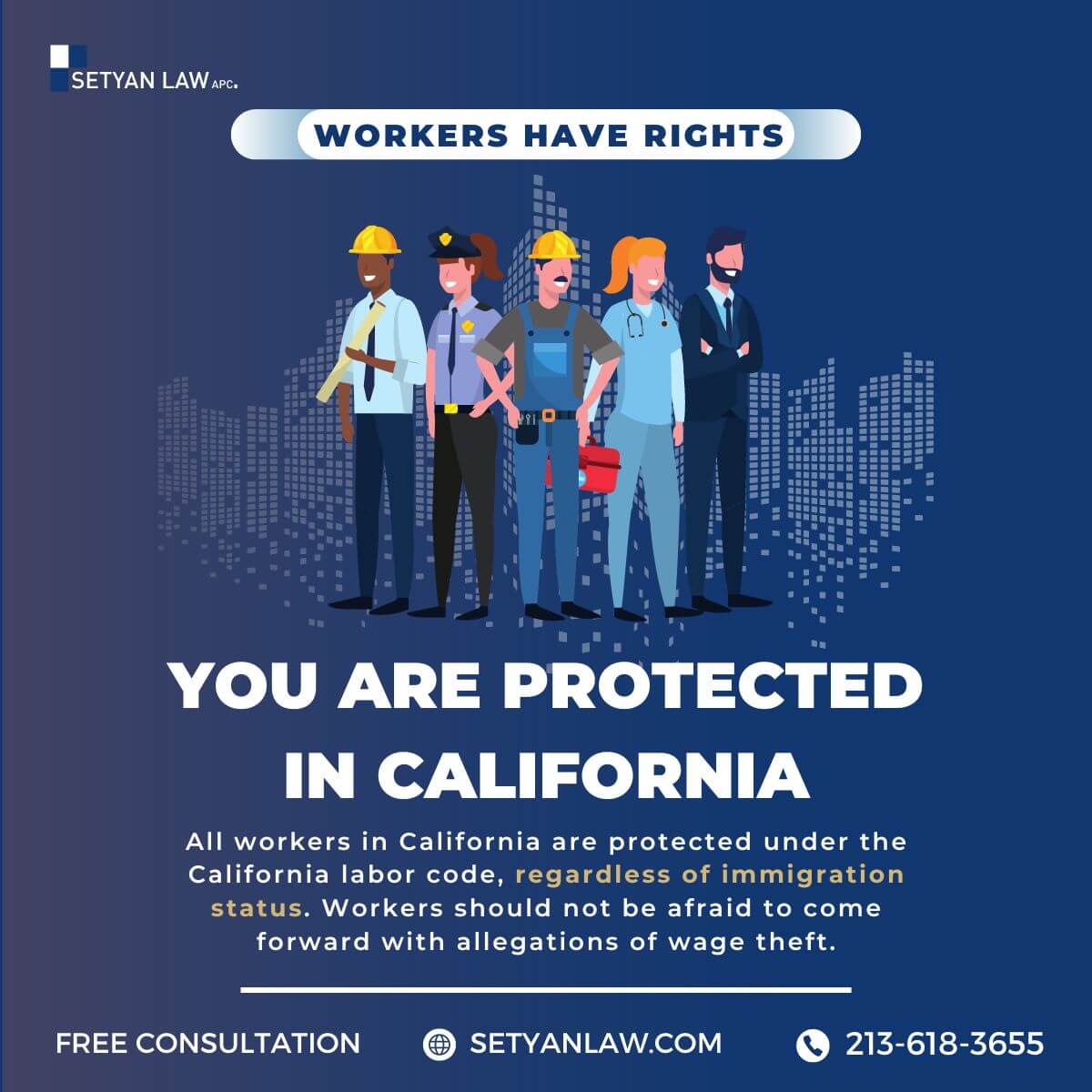Updated June 29, 2024
Were Your Employer’s Actions Illegal?
Navigating the complexities of employment law can be a daunting task, but understanding your rights as an employee is crucial when facing workplace injustices, especially when asking yourself, “Can I sue my employer?” The answer lies in whether laws were broken, and whether or not you can prove that a law was broken.
Whether you’ve experienced discrimination, wrongful termination, or other violations of your employment rights, the decision to take legal action against your employer is not one to be taken lightly. This comprehensive guide will explore the various grounds for suing your employer, the legal process involved, and the key considerations to keep in mind when pursuing such a course of action.
1. Wrongful Termination: When Employers Cross the Line
One of the most common grounds for suing an employer is wrongful termination. While the concept of “at-will” employment in the United States allows employers to terminate employees without cause, there are certain situations where such dismissals are considered unlawful. Wrongful termination can occur when an employer fires an employee for reasons that violate federal or state laws, such as discrimination based on protected characteristics like race, gender, age, or disability, or in retaliation for the employee’s engagement in protected activities like whistleblowing or taking medical leave.
Discriminatory Termination
Employers are prohibited from terminating employees due to their membership in a protected class, such as race, color, religion, national origin, age, disability, or genetic information. If an employee can demonstrate that their termination was motivated by unlawful discrimination, they may have grounds to file a wrongful termination lawsuit.
Retaliation-Based Termination
Employees have the right to engage in protected activities, such as reporting workplace discrimination or harassment, without fear of retaliation from their employer. If an employee is fired or subjected to other adverse employment actions for exercising these rights, they may have a valid claim for wrongful termination.
Breach of Employment Contract
In some cases, an employer may be bound by the terms of an employment contract, whether written or implied. If an employer terminates an employee in violation of the contractual agreement, the employee may have grounds to sue for wrongful termination.
2. Discrimination in the Workplace: Unacceptable and Actionable
Discrimination in the workplace is another common basis for suing an employer. Federal and state laws, such as the Civil Rights Act of 1964 and the Americans with Disabilities Act, prohibit employers from treating employees differently based on their membership in a protected class. Employees who have experienced discrimination in hiring, promotion, compensation, or other employment-related decisions may have grounds to file a lawsuit.
Types of Discrimination
Actionable forms of discrimination include, but are not limited to, discrimination based on race, color, religion, national origin, sex, pregnancy, age, disability, genetic information, and sexual orientation or gender identity.
Disparate Treatment and Disparate Impact
Employees may have grounds to sue their employer for either disparate treatment, where they are intentionally treated differently due to their protected characteristics, or disparate impact, where an employer’s neutral policy or practice disproportionately affects members of a protected class.
Failure to Accommodate
Employers are required to provide reasonable accommodations for employees with disabilities or sincerely held religious beliefs, unless doing so would cause undue hardship. Failure to provide such accommodations may constitute grounds for a discrimination lawsuit.
3. Harassment and a Hostile Work Environment: Unacceptable Workplace Conduct
Workplace harassment, particularly sexual harassment, is another area where employees may have grounds to sue their employer. Harassment that creates a hostile work environment, where the conduct is severe or pervasive enough to interfere with an employee’s ability to perform their job, can form the basis of a lawsuit.
Types of Harassment
Actionable harassment can take many forms, including unwelcome sexual advances, requests for sexual favors, and other verbal or physical conduct of a sexual nature. Harassment based on other protected characteristics, such as race, religion, or disability, may also be grounds for a lawsuit.
Employer Liability
Employers can be held liable for harassment perpetrated by supervisors, coworkers, or even third parties, such as customers or vendors, if the employer knew or should have known about the harassment and failed to take appropriate corrective action.
4. Wage and Hour Violations: Protecting Employee Rights
Employers are subject to a variety of federal and state laws governing wages, overtime pay, and other compensation-related issues. Violations of these “wage and hour” laws can provide grounds for employees to sue their employers.
Minimum Wage and Overtime Violations
Employers must pay their employees at least the applicable minimum wage and provide overtime pay for hours worked in excess of 40 per week. Failure to do so can result in a lawsuit for unpaid wages and other damages.
Meal and Rest Break Violations
Many states, including California, have laws requiring employers to provide employees with mandatory meal and rest breaks. Denying or interfering with these breaks can also form the basis of a lawsuit.
Misclassification of Employees
Employers may attempt to misclassify employees as independent contractors or exempt employees to avoid providing certain benefits and protections. If an employee is misclassified, they may have grounds to sue for unpaid overtime, benefits, and other damages.
5. Retaliation and Whistleblower Protection: Safeguarding Employee Rights
Employees have the right to report unlawful or unethical practices without fear of retaliation from their employer. If an employee experiences adverse employment actions, such as termination, demotion, or reduced pay, as a result of their whistleblowing activities, they may have grounds to file a lawsuit for retaliation.
Whistleblower Protection Laws
Federal and state laws, such as the Sarbanes-Oxley Act and the Dodd-Frank Act, provide specific protections for employees who report violations of the law, fraud, or other misconduct. Employers who retaliate against whistleblowers can face significant legal consequences.
Retaliation for Exercising Rights
Employers are prohibited from retaliating against employees for engaging in other protected activities, such as filing a discrimination or harassment complaint, requesting a reasonable accommodation, or taking leave under the Family and Medical Leave Act (FMLA).
6. Workplace Injuries and Workers’ Compensation: Employer Obligations
Employees who suffer work-related injuries or illnesses are generally entitled to receive workers’ compensation benefits, regardless of who was at fault. If an employer fails to provide these benefits or retaliates against an employee for filing a workers’ compensation claim, the employee may have grounds to sue.
Employer Responsibilities
Employers are required to maintain workers’ compensation insurance and to promptly report and process employee injury claims. Failure to do so can result in legal liability.
Retaliation for Filing a Claim
Employers are prohibited from taking adverse actions against employees for filing a workers’ compensation claim. Employees who experience such retaliation may have a valid lawsuit against their employer.
7. Breach of Employment Contract: When Employers Fail to Uphold Agreements
In some cases, an employer may be bound by the terms of an employment contract, either written or implied. If an employer fails to honor the terms of the contract, such as by terminating an employee without cause or denying promised benefits, the employee may have grounds to sue for breach of contract.
Written Employment Contracts
Formal, written employment contracts often specify the terms of employment, including job duties, compensation, and termination conditions. Violations of these contractual agreements can form the basis of a lawsuit.
Implied Employment Contracts
Even in the absence of a formal written contract, an employer’s policies, procedures, and past practices can create an implied employment contract. Failure to adhere to these implied terms may also give rise to a breach of contract claim.
8. Violations of Employee Privacy: Protecting Sensitive Information
Employers have a responsibility to respect the privacy of their employees and to handle sensitive information, such as medical records and criminal histories, in accordance with federal and state laws. Violations of employee privacy can provide grounds for a lawsuit.
Unlawful Surveillance and Monitoring
Employers may not engage in unreasonable surveillance or monitoring of employees, such as through the use of hidden cameras or excessive internet monitoring, without the employee’s consent.
Misuse of Personal Information
Employers must properly safeguard and use employees’ personal information, such as Social Security numbers and medical records, in compliance with applicable privacy laws.
9. Defamation and Reputational Harm: Protecting Employee Reputation
Employers or coworkers who make false, damaging statements about an employee that harm their professional reputation may be liable for defamation, which can form the basis of a lawsuit.
Libel and Slander
Employees may have grounds to sue for either written defamation (libel) or spoken defamation (slander) if the false statements resulted in tangible harm, such as lost job opportunities or damage to their professional standing.
Malicious Intent
To succeed in a defamation lawsuit, the employee must demonstrate that the false statements were made with actual malice, meaning the employer or coworker knew the statements were false or acted with reckless disregard for the truth.
10. Constructive Discharge: When Resignation Becomes the Only Option
In some cases, an employee may be able to sue for wrongful termination even if they resigned from their position. This is known as “constructive discharge,” where an employer’s actions create such an intolerable work environment that the employee has no choice but to resign.
Intolerable Working Conditions
To establish constructive discharge, the employee must demonstrate that the working conditions were so unbearable that a reasonable person in their position would have felt compelled to resign.
Discrimination and Harassment
Constructive discharge claims often involve situations where the employee faced persistent discrimination, harassment, or other forms of mistreatment that made their continued employment untenable.
Considering Legal Action: Key Factors to Weigh
Before pursuing legal action against an employer, it’s important to carefully consider several key factors to ensure that your case has a strong foundation and that the potential benefits outweigh the risks.
Strength of the Legal Claim
Thoroughly assess the merits of your case, ensuring that you have sufficient evidence and documentation to support your claims. Consult with an experienced employment law attorney to obtain a professional evaluation of your case’s viability.
Potential Outcomes and Remedies
Understand the potential outcomes and remedies available if you prevail in your lawsuit, such as reinstatement, back pay, compensatory damages, and punitive damages. Weigh these potential benefits against the time, effort, and financial resources required to pursue the case.
Impact on the Work Environment
Consider the potential impact that a lawsuit may have on your work environment, including the possibility of ongoing tension, retaliation, or difficulty finding future employment. Evaluate whether the potential benefits outweigh the potential drawbacks.
Alternative Dispute Resolution
Explore alternative dispute resolution methods, such as mediation or arbitration, which may provide a more efficient and less adversarial path to resolving your workplace dispute.
Conclusion: Empowering Employees to Seek Justice
Employees who have experienced workplace injustices, such as discrimination, harassment, or wrongful termination, have the right to hold their employers accountable through the legal system. By understanding the various grounds for suing an employer and the process involved, workers can make informed decisions about pursuing legal action and seeking the justice and compensation they deserve. Remember, consulting with an experienced employment law attorney is crucial to navigating the complex landscape of employment law and ensuring the best possible outcome for your case.
Seek Counsel from a Workplace Litigation Attorney
Navigating the complexities of employment lawsuits can be overwhelming. You will often be up against someone with more money and lawyers. Their primary goal is to derail your case, using technicalities, bringing shady experts and witnesses, or simply settling for a very low amount to get rid of you. Your first move should always be to consult a good attorney that cares. As a veteran employment litigation attorney in Los Angeles, Sam Setyan can provide expert guidance to ensure your rights and professional career are protected. It’s your life.
Call (213)-618-3655 for a consultation.








